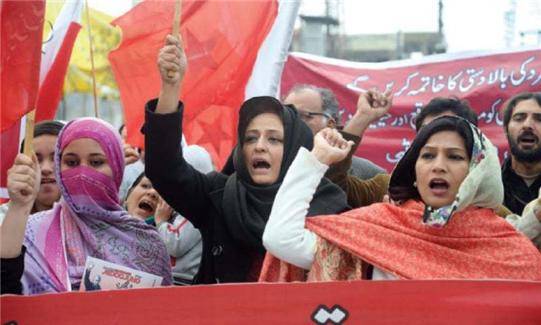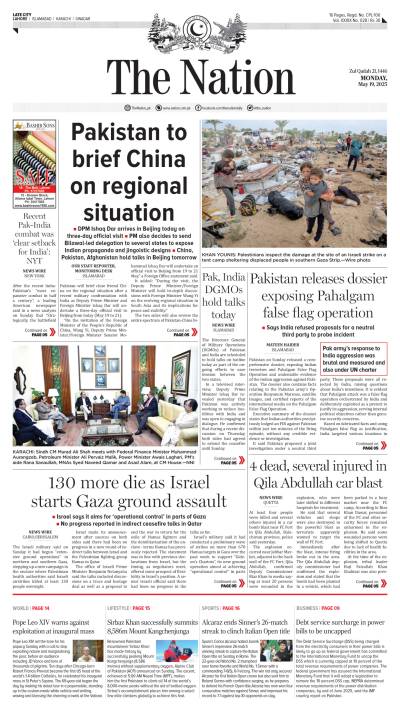Up until now, we’ve only worried about the men who are vehemently opposing the Punjab women protection bill. The men who fear that the heavily patriarchal balance in Pakistan, will become upset by this bill. Those men who deem this bill an abomination; an affront to the very fabrication of their religion, the very one that teaches peace, kindness and mercy towards fellow man, but apparently also, violence against womankind. Surely if they were referring to the Holy Prophet’s (PBUH) Islam, I ask them this: Has the Prophet not set an example by words and actions of how women should be treated with respect and love? How can they justify abuse of women and blame the bill for going against Sunnah?
But this article is not about these men, no, not about these men who raise their voices to keep their ballot boxes full, who blur the lines between facts, fiction and popular sentiment. This is an article about the women for whom this bill and all that it entails, has been created. It is about the women of Pakistan who have long been subjugated, brainwashed and oppressed into believing they are worthless. Their worth has long been measured against the dowry their parents are able to conjure out of poverty and then against the number of sons they will bear for the men they have married. The women who are supposed to take care of the household chores while their brothers attend schools, universities and then offices. Those women who are told from when they are little girls, that a woman’s purpose on this earth is to bear her husband’s children, raise them responsibly and all the while take care of his family, forgetting your own. Let’s first talk about these women.
Throughout my childhood, I saw my mother devote her entire time and energy into raising her four children. We would come home from school to fresh rotis off the stove, three different meals, three times of the day. Even my friends would envy the spoilt and privileged way we were raised. Before she became somebody’s wife and mother, she was a brilliant student who topped in the Punjab matriculation board and aspired to be a doctor. But my grandmother did not allow her to follow her dream of doing so, as she was worried all that studying would make her even more far-sighted and she would have a hard time marrying an eligible bachelor with thick glasses on her face. A woman’s place was at home not running around in a hospital ER in the middle of the night. This thought remains the same twenty-five years later from that era.
If it were not for her courage to enroll herself into a master’s program 25 years after she left school and pass with flying colours, I would not have the courage to write this article today. She set an example for her daughters, by overcoming adversity and societal pressure, that it was important to follow your dreams, as it is your right. But how many women have the opportunity to do the same? While a few women in Pakistan are breaking stereotypes and breaking away from the norms, the majority continues to be discriminated against and subjected to physical, emotional or financial abuse in one way or the other.
Coming back to this bill, the most worrisome obstacle to its enforcement are not the men who object to it today, but the women themselves who despite being educated in some cases, secretly believe that they are helpless and worthless. There are others who believe that an abusive relationship was written in their fate and it was meant to be. Hence, there is no point leaving it. They are weary of their abusers - the husbands or the women of his family more often than not- but they are wearier of the unknown. What will happen to me if I try to report them or leave? Will my parents support my decision? Will these shelters support my children and me and if so for how long? What if I have nowhere to go and I end up on the streets? These are just a fraction of the thoughts a woman in an abusive environment might think of. Can the government really assure the safety and protection of these women from their families who have an unfathomable thirst for blood and vengeance?
While the government may very well applaud itself for passing a historical piece of legislation, it has a long way to go before it can even begin to erase decades of cultural discrimination, of empowering women to understand what their rights are and be able to make use of these laws made to protect them. Even in the most educated and forward thinking households, divorce is discouraged vehemently, young girls are raised to believe in compromising on their dreams and keeping them aligned with those of her husband to be. The religious discourse in our society focuses on incidences that reiterate the role of a docile woman who must please her husband and omits stories of bravery, courage and financial independence displayed by the women of the Holy Prophet’s (PBUH) era. Hazrat Khadijah was not only the Prophet’s most beloved wife but she was also a successful business woman, an aspect of her life the Prophet never demanded be given up. Why don’t we teach our daughters this instead of drilling conformity and compromise in their heads?
My university professor once said, “A woman is a woman’s worst enemy in Pakistan”. I have only now come to realize what she meant by this seemingly morbid statement when I witnessed a mother sending back her daughter and her four children back to the man who broke all her bones and threw her out on the street, because she was unable to provide or care for her. Mothers should raise their daughters into strong individuals who are aware of their religious and societal rights. They must set an example of equality and justice alike. When they leave abusive relationships they teach their daughters to not bear the same fate. This is the only way we can begin to reverse the decades of oppression, discrimination and cultural pressure on a woman, so she may understand what is truly her worth.
Monday, May 19, 2025
For your daughters

The writer is a member of staff
-
Lahore emerges among safest global cities in Numbeo 2025 index
-
Lahore emerges among safest global cities in Numbeo 2025 index
-
India’s suspension of Indus Water Treaty legally baseless
-
Seventh polio case reported in Pakistan amid nationwide vaccination drive
-
Pakistan reports sixth polio case of 2025
-
PTA begins issuing VPN licences to regulate usage
Regional Reset
May 19, 2025
Peak Potential
May 19, 2025
United Front
May 19, 2025
Culture Shift
May 18, 2025
Tactical Shift
May 18, 2025
Pakistan’s Strategic Edge
May 19, 2025
Lessons for India
May 19, 2025
Galiyat’s Poor Network Services
May 19, 2025
A City in Neglect
May 19, 2025
Rising Cost of Living
May 19, 2025
ePaper - Nawaiwaqt
Nawaiwaqt Group | Copyright © 2025





